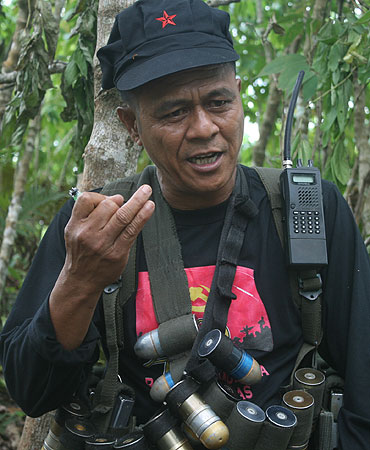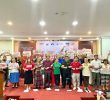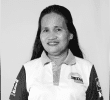DAVAO CITY—The motorcycle ride to Paquibato where we were set to interview New People�s Army (NPA) rebel Leoncio Pitao, more known as Kumander Parago, was not for the half-hearted.
The roads were rough all the way up and the ridges the motorcycle traversed could be very treacherous. It was a good many hours before the engine finally halted and we could then inspect if our bones were still intact.
Soon enough, we were on our way trekking. We only stopped when we saw some items of clothing spread on the grass. Then the guide turned to the narrow path towards the bushes and called on to someone. �Go! Naa kay bisita. (Go, you have a visitor).�
We proceeded down the footpath through the bushes. There was practically nothing around us to tell us it was a camp. There was no physical structure in sight, only hammocks and backpacks and those young men, arms by their sides, still managing to press a smile to greet us. They wore black sweatshirts with hammer and sickle printed on it. They were the guerrilla fighters of the First Pulang Bagani Command of the NPA, the unit that Parago heads.
We were then led to what they call �the hall� � a makeshift row of benches, consisting of branches of shrubs attached to some trees. As soon as we settled ourselves, Parago came.
He was wearing the same black sweatshirt as the other men except for his Mao cap and a vest of M203 bullets. We took a deep breath to ask our first question.
How did he take the news on his daughter�s death?
�I have long understood this as part of the war of the poor versus the capitalists,� he began. �The revolution is not a banquet.�
For all the years he spent in the communist movement, Parago admitted that what happened to his daughter was one of the biggest �sacrifices� he was called to make as a revolutionary.
Sure, there were moments in the past, when it broke his heart thinking that his children could not almost recognize him because he was out most of the time.
Twice, too, he conquered death when he was hit by enemy bullets.
�I used to tremble at the sound of gunshots,� he said. �I used to think, would I ever see my mother again,� he recalled his early days as a young revolutionary.

Kumander Parago. (davaotoday.com photo by Barry Ohaylan)
�Each guerrilla has to come to terms with things,� he said. �Life in the revolution is very hard but if you understand what you are here for, you would think that there is no sacrifice you cannot bear.�
Parago has been a rebel for 31 years. But not even once did it ever occur to him to quit. �Mopahulay lang ko kung kadaugan na (I will only lie low after victory time),� he said.
�If only you try to understand and see for yourself what the masses are eating; why there are farmers who have no land, workers who are not paid for their toil, why there are those killed by the military even without doing anything wrong, it can make you strong,� Parago said.
Parago thinks life is hard for many Filipinos because of the greedy capitalists.
�Have you ever wondered why there are people who are eating well and there are many who are not? Why the hectares of plantation lands belong only to a few? Aren�t those lands supposed to go to those who till them, the farmers?� he said.
When asked if the death of his daughter has weakened his resolve to continue, Parago said the military are fools to think that way.
Even with his daughter�s death, Parago has kept his sight of things. �What happened to my daughter, also happened to the sons and daughters of countless other poor who are made to suffer in the hands of these brute troops of capitalists. What they failed to see is that this gives us all the more reason to fight them,� he said.
Thirty one years ago, he was a son of a poor farmer from Loreto, Agusan del Sur, whose father was mauled by the military till he coughed up blood. Now he is one of the most known guerrilla leaders in Southern Mindanao and the most wanted.
As far as Parago knows, his daughter was killed because she is his daughter.
He may have accepted the sad reality of his daughter�s fate, but what he could not accept is that, her killers did not follow the rules of war. “Even in a war, there are rules that must be followed,” he said. �You only shoot at legitimate targets. That child of mine was defenceless! She is only a girl going home from work, teaching at an elementary school to earn her keeps,� the rebel leader pointed.
�These savage troopers of capitalists had to make my family put up with their relentless surveillances! Who else has the motive and the capacity to do that to my family? If they can fool others, they cannot fool me. We will be seeing each other one day,� he said.
Three years ago, two men bearing knives attempted at the life of his eldest son, Ryan. They tried to stop the motorcycle he was driving for a living in Barangay Toril. Ryan is now 24, fighting side by side with his father.
�The poor boy just wanted to earn a living. But he was not given a chance,” Parago recalled how he tried to convince his son to come and join him in the NPA. Ryan became an NPA at 21, the age that he also became one. “I told him, you see, I am no Diego Salvador (a hero in a radio soap opera popular in the 1970s) who can come to your rescue any time these savages strike.�
�I just wanted to live a normal life,” said Ryan who never planned joining the NPA.”But they challenged me to fight against them. After what they did to my sister, there is no turning back.�
Parago�s second child, Rio, 22, also complained of being hounded in school by burly-looking men. This continued up to the time when she was already working as a nurse at a city hospital. Parago is prepared that his enemies might even come for his entire family, but nothing of it will ever make him surrender his cause.
�Agwantahon ko ning tanan para sa katawhan. Dili nako pwede talikdan ang katawhan (I will bear these things for the people. I cannot turn my back from the people,)� he said.
Parago believes that much of society�s woes are due to the control of resources by the capitalists. This, according to him, was his reason to fight and join the NPA.
Until this would change, he would not lay down his arms.
�They own the lands. They can even control the prices of commodities. How can people�s lives get better under this scheme of things?,� he asked. �But there is a way to break free from this exploitative system. That is why we must continue fighting.� (Cheryll D. Fiel/davaotoday.com)










